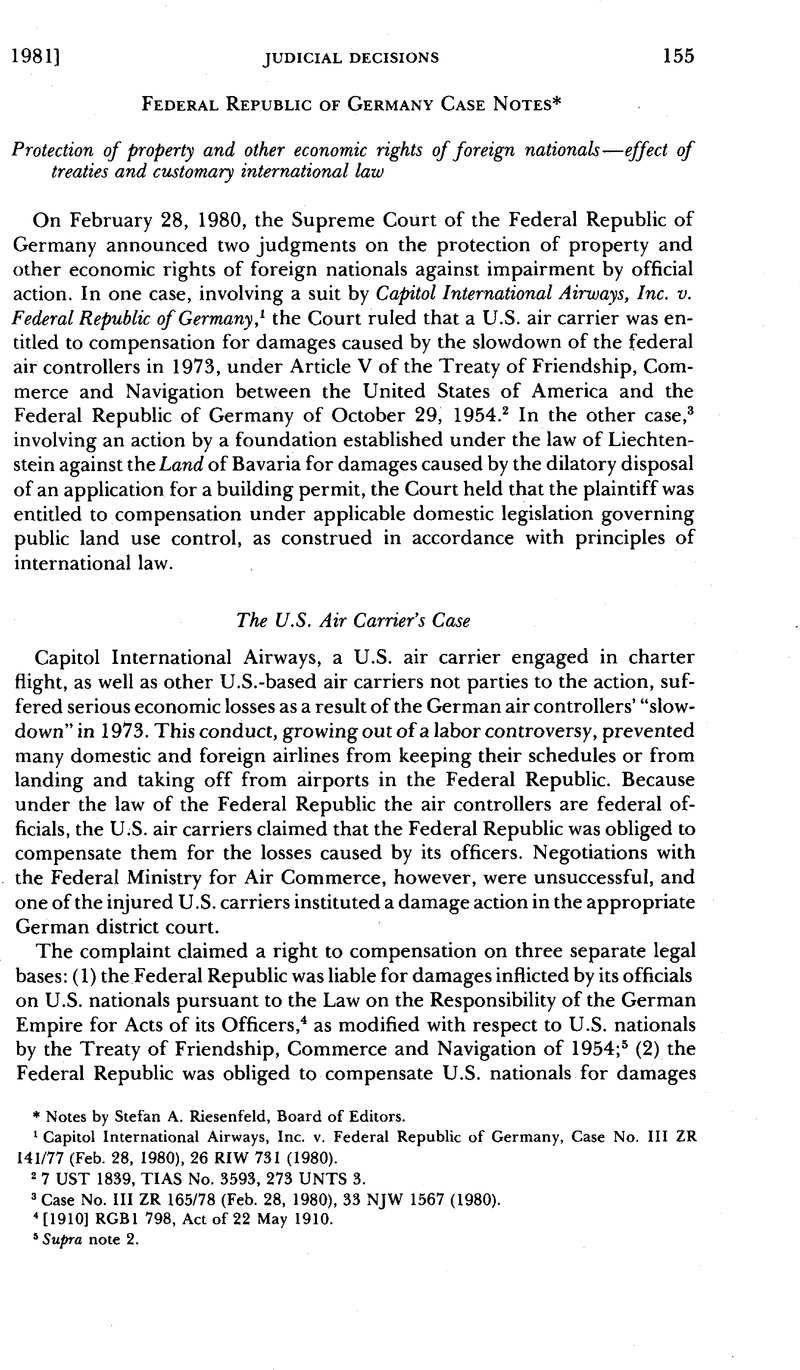No CrossRef data available.
Article contents
Federal Republic of Germany Case Notes*
Published online by Cambridge University Press: 27 February 2017
Abstract

- Type
- Judicial Decisions
- Information
- Copyright
- Copyright © The American Society of International Law 1981
Footnotes
Notes by Stefan A. Riesenfeld, Board of Editors.
References
1 Capitol International Airways, Inc. v. Federal Republic of Germany, Case No. Ill ZR 141/77 (Feb. 28, 1980), 26 RIW 731 (1980).
2 7 UST 1839, TIAS No. 3593, 273 UNTS 3.
3 Case No. III ZR 165/78 (Feb. 28, 1980), 33 NJW 1567 (1980).
4 [1910] RGB1 798, Act of 22 May 1910.
5 Supranote 2.
6 Supranote 4.
7 Supranote 4, at 800. This section has repeatedly been held not to have been superseded by Article 131.of the Weimar Constitution or Article 34 of the Bonn Basic Law, RG, III 486/24 (Sept. 25, 1925), III RGZ 294 (1926); RG, III 277/34 (Sept. 17, 1935), 149 RGZ 83 (1936); BGH, III ZR 45/53 (May 10, 1954), 13 BGHZ 241 (1954), 7 NJW 1283 (1954); BGH, III ZR 48/55 (Oct. 1, 1956), 9 NJW 1836 (1956); BGH, III ZR 6/56 (July 13, 1957), 8 Vers R 642 (1957); BGH, III ZR 96/66 (July 13, 1961), 14 NJW 1811 (1961). SeeP. Dagtoglou, Kommentar Zum Bonner Grundgesetz, Art. 34, marg. notes 327-36 (rev. ed. 1970).
8 Article VI, para. 1 provides: Nationals and companies of either Party shall be accorded national treatment with respect to access to the courts of justice and to administrative tribunals and agencies in the territories of the other Party, in all degrees of jurisdiction, both in pursuit and in defense of their rights. It is understood that the companies of either Party not engaged in activities within the territories of the other Party shall enjoy such access therein without any requirement of registration or domestication.
9 Article VII, paras. 1 and 4 provide: 1. Nationals and companies of either Party shall be accorded, within the territories of the other Party, national treatment with respect to engaging in all types of commercial, industrial, financial and other activity for gain, whether in a dependent or an independent capacity, and whether directly or by agent or through the medium of any form of lawfuljuridical entity. Accordingly, such nationals and companies shall be permitted within , such territories: (a) to establish and maintain branches, agencies, offices, factories and other establishments appropriate to the conduct of their business; (b) to organize companies under the general company laws of such other Party, and to acquire majority interests in companies of such other Party; and (c) to control and manage enterprises which they have established or acquired. Moreover, enterprises which they control, whether in the form of individual proprietorships, companies or otherwise, shall in all that relates to the conduct of activities thereof, be accorded treatment no less favorable than that accorded like enterprises controlled by nationals or companies of such other Party. 4. Nationals and companies of either Party, as well as enterprises controlled by such nationals or companies, shall in any event be accorded most-favored-nation treatment with reference to the matters treated in the present Article.
10 The English translation of the note, dated May 3, 1979, which was transmitted to the Senate Committee on the Judiciary by the Department of State, is reprinted inthe Antitrust Enforcement Act of 1979, S. REP. NO. 96-239, 96th Cong., 1st Sess. 71 (1979).
11 434 U.S. 308 (1978).
12 The amendment proposed by Senator DeConcini was introduced as S. 2486, 95th Cong., 2d Sess. (1978), and explained on the Senate floor on Feb. 6, 1978, 124 CONG. REC. SI 190 (daily ed. 1978). It was incorporated with slight changes in S. 1874, 95th Cong., 2d Sess., as reported, and S. 300, 96th Cong., 1st Sess. (1979).
13 The Mathias substitute was introduced on April 23, 1979, 125 CONG. REC. S4488 (daily ed. 1979).
14 S. REP. NO. 96-239, supranote 10, at 46, 62, and 76.
15 Id.at 72.
16 According to German constitutional law, self-executing treaty provisions supersede inconsistent prior statutory rules.
17 Case No. Ill ZR 165/78, 33 NJW 1567 (1980).
18 Bverfg, 2 BvR 59/71 (March 23, 1971), 30 Bverfge 409 (1971).
19 Law of 14 July 1904, [1904] RGB1 321.
20 The Court assumed almost axiomatically that the national treatment and the mostfavored- nation treatment accorded by Articles VI and VII, respectively, as well as the overall policies of the Friendship Treaty, related in each case to the identical “subject matter” or “sphere of relations.” Seethe terminology of the International Law Commission in its (final) Draft Articles on Most-Favored-Nation Clauses in Treaties Between States, Arts. 4,9, 10( 1), and 19, [1978] 2 Y.B. INT'L L. COMM'N, pt. 2, at 18, 27, and 51. It concluded on the basis of case law relating to other treaties that the subject matter of both clauses in Articles VI and VII of the U.S.-Germany Friendship Treaty related only to access to the courts and entry into gainful activities, and that a grant of remedies was not “within the limits of the subject-matter” of these clauses as envisaged by Articles 9 and 10 of the ILC draft; thus, the panel disregarded the Law Revision Commission's comment: “every treaty requires independent examination.” Id.at 20.


